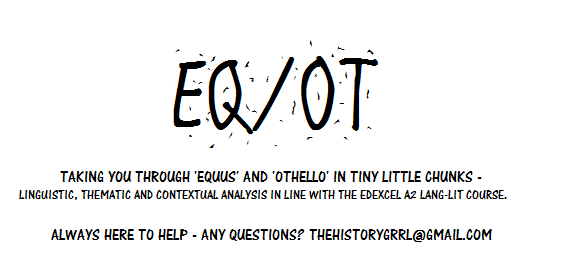How do the playwrights use the theme of "courage" to portray individuals in society?
In Shakespeare's 'Othello' and Shaffer's 'Equus', the playwrights use the theme of courage to portray two very different characters: Dysart, who is seen as an individual in his unwillingness to follow social expectations and treat Alan, something which he later over-comes, thus illustrating his courage; and Othello, whose courage is used to describe him from the start so that his tragic fall more rapidly isolates him.
OTHELLO
- SF courage, Act 2 ("the man commands like a full soldier", "the warlike Moor Othello", context that actually lost Cyprus wars)
- Honourability - "Not I: I must be found", Act One (unexpected of a lascivious Moor)
- Compares his death to former acts of courage, making him seem somewhat redeemed in death (imperatives "Set you down this"; metaphor "the circumcised dog"; context of wars & victory = courage)
DYSART
- Hedges "Maybe" and "possibly" show unease at what has to do (link changing nature of psychiatry and American anti-psychiatry movement) - makes eventual choice more courageous
- Elogy at end (soliloquy reminiscent of Shakespearean epilogue) - shows will do what has to do, despite not wanting to
- Perenthesis - "alright! I'll take it away" - shows pressure & pain at what he has to do
The opposite is then true of their counterparts, arguably the antagonists whom the playwrights present as individuals through their cowardice: Alan, who feels the need to seek revenge against a repressive God, and Iago, who critics argue is a character of pure evil, and this can be seen as cowardly through his easy manipulation and deception of Othello, who is presented as both courageous and vulnerable because of his race.
IAGO
- "I hate the Moor, and it is thought" - audience won't believe, making assertions to provide rationale for the plan only makes him seem more cowardly
- Exploitation of Othello; "O, beware, my Lord, of jealousy"
- Use of soliloquy = inability to admit plans = keeping things hidden = cowardly
- Lies and dramatic irony exacerbate this
ALAN
- Use of jingles = backing away (link // 70s materialism)
- Refusal to speak
- Simple sentences show fear; exclamatories towards the end (link Catholic God)
Remember: much of this exam is pretty contrived, and the theme of courage is especially so. Define your terms and back your points up: in English, you're ability to argue and use terminology is key. You could be completely wrong, but if you assert your argument well you could still be right...
Does that even make sense?
- HistGrrl x
Saturday, 19 June 2010
Essay Plan: Courage
Labels:
Alan,
argument,
courage,
Dysart,
equus,
essay plan,
essay technique,
Iago,
othello
Subscribe to:
Post Comments (Atom)




We are now reading Othello for the Literature class and I have asked my essay writer to help me with the task. This writer is writing his poems ,and he can write grate creative assignments.
ReplyDelete